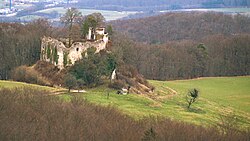Neu-Schauenburg Castle
| Neu-Schauenburg Castle | |
|---|---|
Ruine Neu-Schauenburg | |
| Frenkendorf | |
 Neu-Schauenburg from the south (2010) | |
| Coordinates | 47°30′2.07″N 7°40′56.5″E / 47.5005750°N 7.682361°E |
| Type | Hill castle |
| Code | CH-BL |
| Height | 600 m above the sea |
| Site information | |
| Condition | Ruins, Preserved Walls |
| Site history | |
| Built | 12th century (possible 11th century) |
| Materials | Stone |
Neu-Schauenburg is a ruined castle in the commune of Frenkendorf, Switzerland. It is located near the border of France and Germany, and little of the castle remains because of geological events.
History
[edit]There were two Schauenburg castles near Frenkendorf, Alt (or Old)-Schauenburg about 1 km (0.62 mi) southwest of the village on the top of Chleiflüeli hill and Neu (or New)-Schauenburg to the west. A first castle was probably built for the Lords of Schauenburg in the 11th century, however nothing is known about it. In the 13th century the original castle was replaced by a new castle. The 1356 Basel earthquake destroyed much of it, but unlike Alt-Schauenburg, it was quickly rebuilt. The Schauenburg family became extinct in 1385 and the castle became a fief under the Bishop of Basel.[1] In 1397 it was sold and then over the following centuries passed through several additional owners. However, by the 15th century, it had been abandoned and began to fall into ruin.[2]
By 1480 a group of Beguines lay sisters had occupied the towers of Neu-Schauenburg and established a cloistered house in the ruins. The order remained at Schauenburg until 1523. In 1691 mineral springs were discovered and a bath house was built near the castle ruins. In 1792 a small country estate with attached fields was built near the ruins.[2]
Origin of the name
[edit]Neu-Schauenburg was built before Alt-Schauenburg, but because Alt-Schauenburg was destroyed and abandoned first, it came to be known as the old or alt- castle.
Castle site
[edit]The castle was built on a rocky spur above the valley. It has an irregular floorplan and a gate on the north side with a 2 m (6.6 ft) thick castle wall that follows the edge of the spur. The top of the spur is divided down the center by a narrow band of rock into higher eastern and lower western halves.[1]
See also
[edit]References
[edit]- ^ a b Swiss Castles.ch (in German) accessed 20 April 2016
- ^ a b Schauenburg in German, French and Italian in the online Historical Dictionary of Switzerland.

